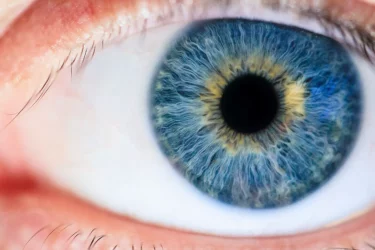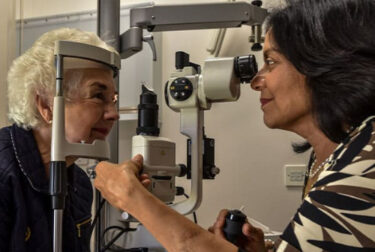Need treatment and want to know how long cataract surgery takes? Look no further. In this blog, we explore the procedure, recovery timings and surgery preparation to get you ready for your upcoming procedure.

Wellsoon self-pay surgery
Choose Wellsoon self-pay surgery from Practice Plus Group. With no hidden costs, you’ll pay less than you might think and be back to your best sooner than you thought.
- Surgery in 4 to 6 weeks*
- No hidden costs
- Flexible finance options
To chat about Wellsoon self-pay surgery options, call our Private Patient Advisors today, on 0330 818 8945. Alternatively, you can email us on privatepatient@practiceplusgroup.com
How long does a cataract operation take?
Cataract surgery is a relatively simple procedure and typically takes about 15 minutes. Of course, some cases are more complex, meaning the operation can take up to half an hour or more.
How long does cataract surgery take for one eye?
From start to finish, surgery takes around 20 minutes to complete.
For both eyes?
It’s very rare that both eyes would be treated on the same day. This would only happen in exceptional circumstances.
How long does a cataract assessment take?
A pre-operative cataract assessment is our opportunity to explain your treatment to you and make sure that you are well enough to go ahead with it. It is also your opportunity to meet the team who will care for you and to ask any questions. Pre-operative cataract assessments can take anything between one to two hours depending on any additional diagnostic tests that need to be carried out.
How long does it take to do cataract surgery from start to finish?
The procedure itself takes about 15 minutes to complete, depending on whether there are any complications. From arriving on the day of your surgery to leaving the hospital, it usually takes around two to three hours.
How long to wait between cataract surgery on each eye?
If you need surgery on both eyes, the procedures are usually done around 6 to 12 weeks apart. This is to allow for a suitable amount of recovery time. You will need a check up on your operated eye 2 to 4 weeks after your operation. If your first eye is recovering well, you will be listed for surgery for the other eye.
Surgery on both eyes during the same procedure is called bilateral cataract surgery. Please note that this is not performed at Practice Plus Group.
How long does it take to recover from cataract surgery?
Cataract surgery is a relatively simple procedure with a high success rate. It is the most successful and frequently performed operation in the UK with over 325,000 cases annually and over 90% of patients experiencing a significant improvement in their vision.
It can take up to six weeks to fully recover from this eye surgery. However, many people experience an improvement in their vision within hours of the operation.
How long after cataract surgery can you see?
Every eye is different. Some patients will be able to see clearly just a day or two after their surgery, while others may need more time.
How long does vision stay blurry after cataract surgery?
Blurred vision is normal following this surgery. Sometimes the eye will develop swelling of the cornea (the clear window at the front of the eye), which can cause blurred or misty vision. In most cases, this resolves within the first week. Speak to your doctor if these symptoms persist.
How long do you have to stay in hospital after cataract surgery?
Cataract surgery is a day-case procedure, meaning you won’t need to stay overnight. Most people leave the hospital a couple of hours after their treatment.
How long is bed rest after cataract surgery?
You won’t need bed rest following surgery. However, we do advise taking it easy for the first three weeks after your procedure.
How long do you use drops after cataract surgery?
You will be given eye drops to use for up to four weeks after your surgery.
How long do you wear an eye shield at night after cataract surgery?
After your surgery, you may be given a plastic shield to protect your affected eye(s). This can usually be taken off the next day but you will need to wear it at night for around a week.
How long after cataract surgery can you bend over?
While it may seem an odd question, bending over or leaning forward for any length of time can put pressure on your eye. This can affect the healing process. Try to avoid bending over for the first two weeks after surgery.
How long are you off work after cataract surgery?
This depends on the type of work you do and how long you take to recover. Other factors like whether you need glasses to work may also play a part as you will need to wait until your eyes are fully healed.
How long after cataract surgery can you drive?
The cataract surgery recovery process is different for everyone so it’s important to follow the advice of your doctor. He or she will let you know when it is safe for you to drive after cataract surgery. Typically, as long as you meet DVLA guidelines, you should be fit to get back behind the wheel.
How long after cataract surgery can you fly?
We typically recommend staying local to your treatment hospital for three weeks following cataract surgery. This is in the event of any postoperative complications.
Talk to your doctor to find out when it is safe for you to fly after eye surgery.
How long after cataract surgery can you wear makeup?
You should avoid wearing eye makeup for about a month following your operation. The elements used in makeup can irritate the eye and potentially delay your recovery.
How long after cataract surgery can you swim?
You should avoid swimming for the first four to six weeks after surgery. Talk to your doctor to get an idea of when you can get back in the pool.
How long does cataract surgery last?
In most cases, cataract surgery is a permanent solution. During the procedure, the natural lens is replaced with an artificial one, meaning the cataract cannot return. The artificial lens (often an intraocular lens) is designed to be very long-lasting.
In some cases, further laser eye treatment is needed. If you experience cloudy vision following your surgery, you may need to contact your optician to get a referral.
If you’re experiencing any of the signs or symptoms of cataracts, don’t delay! A timely eye examination can be the difference between early cataract treatment and sight deterioration.







